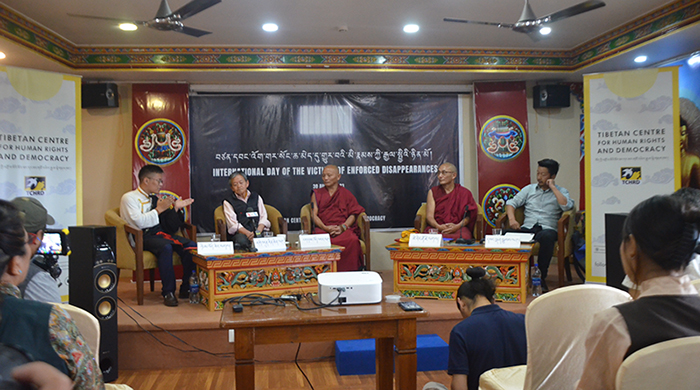Dharamshala — Former Tibetan political prisoners shared their experiences of torture, injustice and enforced disappearance in Chinese prisons, during the commemoration of the International Day of the Victims of Enforced Disappearances in Dharamshala. One of them recounted the torture he suffered in prison: "I could not tolerate the torture inflicted by the Chinese authorities, and if I had the chance, I would commit suicide."
The Tibetan Centre for Human Rights and Democracy (TCHRD) organised a round table with former Tibetan political prisoners and human rights researchers to commemorate the International Day for the Victims of Enforced Disappearance on August 30, 2023. The main speakers were former Tibetan political prisoner Gendun Rinchen, Ven Ngawang Woebar, Geshe Tsering Dorjee and Tibet Watch researcher Wangden Kyab. Students, youths and representatives of Tibetan organisations in Dharamshala also took part in the discussion.
Ms Tenzin Dawa, Executive Director of the TCHRD, gave a presentation on the subject of enforced disappearances, in which she highlighted the case of Gedhun Choekyi Nyima, who was abducted by Chinese government agents after being recognised as the 11th Panchen Lama by His Holiness the 14th Dalai Lama. Ms Dawa expanded on the concerns expressed by various UN human rights experts and highlighted the unjust imprisonment of Tibetan writer Dhi Lhaden, Tibetan singer Lhundrup Drakpa and Tibetan teacher Rinchen Kyi. Ms Dawa also referred to the appeal launched by the UN Special Rapporteurs in China on August 10, 2023, calling for the immediate release of nine Tibetan human rights defenders and activists unjustly sentenced to up to 11 years in prison, as well as the joint communication letter sent to the Chinese government by six UN independent experts on June 26, 2023.
The organiser showed an explanatory video on enforced disappearances, highlighting the challenges and human rights violations faced by Tibetans, including educators, monks, intellectuals and activists. In flagrant acts of crimes against humanity, many Tibetans have been subjected to enforced disappearance, leaving their fate uncertain for long periods. Tibetans have been subjected to arbitrary detentions, which often pave the way for enforced disappearances, leading to subsequent cases of torture and inhuman treatment under broad and vague allegations of instigating "social instability" or "separatism".
The discussion was moderated by Nyima Woeser, a Tibetan researcher at the Tibetan Centre for Human Rights and Democracy (TCHRD), and each of the speakers began by recounting their personal experiences as political prisoners.
The former Tibetan political prisoner Gendun Rinchen began by recounting his journey from his arrival in exile in 1959. He studied at a school for Tibetan refugees in Mussoorie. He returned to Tibet in 1985 and worked in Lhasa as a tourist guide. Despite China's attempts to change the perception of the new Tibetan generation, Gendun Rinchen, as a tourist guide, passed on information about human rights to tourists and journalists. He was arrested on May 13, 1993 for attempting to deliver petitions to a visiting European delegation. His detention, which lasted eight months, included three months of intensive interrogation. Former Tibetan political prisoner Ven Ngawang Woebar took part in the Tibetan protest in Lhasa, carrying the Tibetan national flag with 20 other monks from Drepung monastery on September 27, 1987, and was arrested with other protesters the same day. Ven Woebar recounted his experience of the protest, their involvement in the protest and their life in Chinese prisons. He said: "The most serious torture is mental torture. The Chinese police asked me questions about my family, my relatives, my teachers and my classmates in the monasteries, and I was afraid that they would be arrested and tortured because of me".
"The protesters were beaten and forced to betray each other, after which they were sentenced to years in prison or enforced disappearance," Ven Woebar added.
Geshe Tsering Dorjee, former political prisoner and a student of late Tulku Tenzin Delek, the advocate for the preservation of the Tibetan environment, language, culture and religion. Geshe Tsering recounted his experiences in Chinese prisons, describing various methods of torture, including beatings, electrocution and the use of needles at the fingertips, which cause immense pain, bruising and infections due to the unsanitary conditions in which they are held. He explained how Tibetan political prisoners are treated like animals by the Chinese authorities.
Mr Wangden Kyab, a human rights researcher, who highlighted China's ongoing violation of its own constitution and national laws, as well as its failure to meet its obligations under the international treaties it has signed and ratified, particularly regard to Tibetans and Tibetan political prisoners.


![Tibet has a rich history as a sovereign nation until the 1950s when it was invaded by China. [Photo: File]](/images/stories/Pics-2024/March/Tibet-Nation-1940s.jpg#joomlaImage://local-images/stories/Pics-2024/March/Tibet-Nation-1940s.jpg?width=1489&height=878)
















